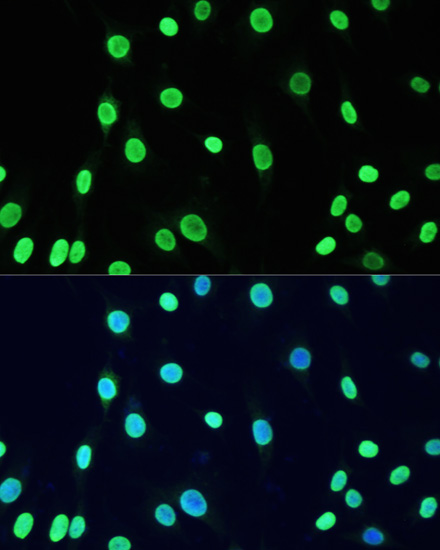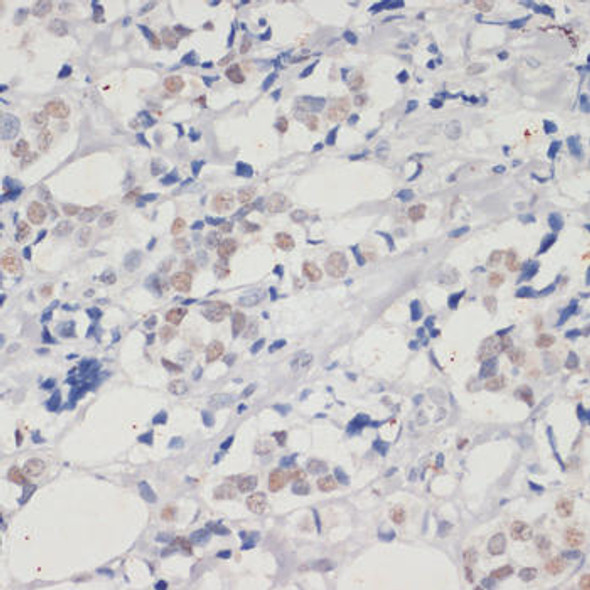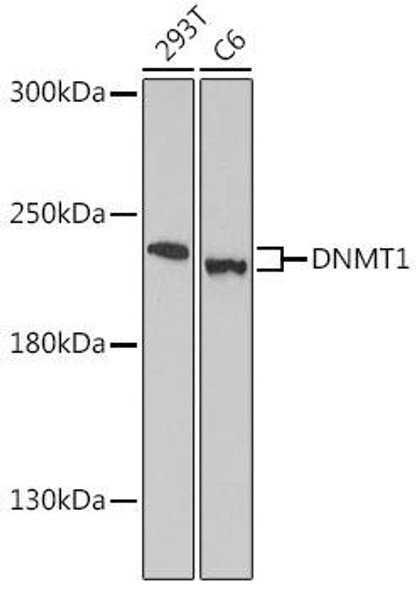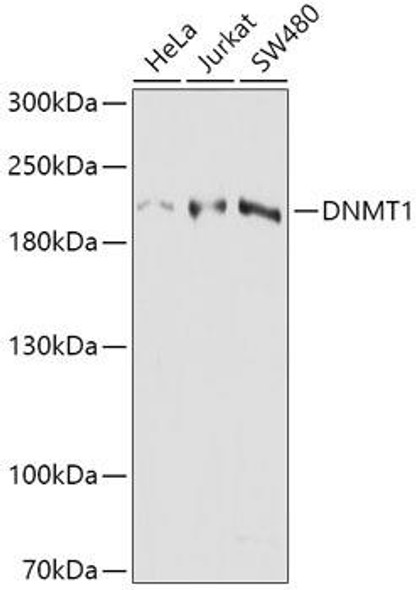Epigenetics & Nuclear Signaling Antibodies 2
Anti-Acetyl-DNMT1-K1127/K1129/K1131/K1133 Antibody (CAB5595)
- SKU:
- CAB5595
- Product Type:
- Antibody
- Reactivity:
- Human
- Reactivity:
- Mouse
- Reactivity:
- Rat
- Host Species:
- Rabbit
- Isotype:
- IgG
- Antibody Type:
- Polyclonal Antibody
- Research Area:
- Epigenetics and Nuclear Signaling
Description
| Antibody Name: | Anti-Acetyl-DNMT1-K1127/K1129/K1131/K1133 Antibody |
| Antibody SKU: | CAB5595 |
| Antibody Size: | 20uL, 50uL, 100uL |
| Application: | IHC IF |
| Reactivity: | Human, Mouse, Rat |
| Host Species: | Rabbit |
| Immunogen: | A synthetic peptide of human DNMT1 |
| Application: | IHC IF |
| Recommended Dilution: | IHC 1:50 - 1:100 IF 1:50 - 1:100 |
| Reactivity: | Human, Mouse, Rat |
| Positive Samples: |
| Immunogen: | A synthetic peptide of human DNMT1 |
| Purification Method: | Affinity purification |
| Storage Buffer: | Store at -20'C. Avoid freeze / thaw cycles. Buffer: PBS with 0.02% sodium azide, 50% glycerol, pH7.3. |
| Isotype: | IgG |
| Sequence: | Email for sequence |
| Gene ID: | 1786 |
| Uniprot: | P26358 |
| Cellular Location: | Nucleus |
| Calculated MW: | 144kDa/183kDa/184kDa |
| Observed MW: | Refer to figures |
| Synonyms: | ADCADN, AIM, CXXC9, DNMT, HSN1E, MCMT, m.HsaI, DNMT1 |
| Background: | This gene encodes an enzyme that transfers methyl groups to cytosine nucleotides of genomic DNA. This protein is the major enzyme responsible for maintaining methylation patterns following DNA replication and shows a preference for hemi-methylated DNA. Methylation of DNA is an important component of mammalian epigenetic gene regulation. Aberrant methylation patterns are found in human tumors and associated with developmental abnormalities. Variation in this gene has been associated with cerebellar ataxia, deafness, and narcolepsy, and neuropathy, hereditary sensory, type IE. Alternative splicing results in multiple transcript variants. |
| UniProt Protein Function: | DNMT1: an ubiquitous DNA methyltransferase that methylates CpG residues. Preferentially methylates hemimethylated DNA. It is responsible for maintaining methylation patterns established in development, and may play an active role in DNA damage repair. Mediates transcriptional repression by direct binding to HDAC2. Its abundance is reduced to non detectable levels at the G0 phase of the cell cycle and is dramatically induced upon entrance into the S-phase of the cell cycle. Interacts with HDAC1 and with PCNA. Forms a complex with DMAP1 and HDAC2, with direct interaction. Forms also a stable complex with E2F1, BB1 and HDAC1. Binds MBD2 and MBD3. Three isoforms of the human protein produced by alternative splicing have been described. |
| UniProt Protein Details: | Protein type:Methyltransferase, DNA; EC 2.1.1.37; Cell development/differentiation; Methyltransferase; Transcription regulation; Amino Acid Metabolism - cysteine and methionine Chromosomal Location of Human Ortholog: 19p13.2 Cellular Component: nucleoplasm; centric heterochromatin; replication fork; nucleus Molecular Function:DNA (cytosine-5-)-methyltransferase activity; protein binding; methyl-CpG binding; DNA binding; zinc ion binding; RNA binding; chromatin binding; DNA-methyltransferase activity; transcription factor binding Biological Process: negative regulation of histone H3-K9 methylation; transcription, DNA-dependent; maintenance of DNA methylation; negative regulation of gene expression, epigenetic; DNA methylation; gene expression; negative regulation of transcription from RNA polymerase II promoter; positive regulation of histone H3-K4 methylation; chromatin modification; gene silencing; regulation of gene expression, epigenetic; DNA methylation on cytosine; regulation of cell proliferation Disease: Cerebellar Ataxia, Deafness, And Narcolepsy, Autosomal Dominant; Neuropathy, Hereditary Sensory, Type Ie |
| NCBI Summary: | DNA (cytosine-5-)-methyltransferase 1 has a role in the establishment and regulation of tissue-specific patterns of methylated cytosine residues. Aberrant methylation patterns are associated with certain human tumors and developmental abnormalities. Two transcript variants encoding different isoforms have been found for this gene. [provided by RefSeq, Aug 2008] |
| UniProt Code: | P26358 |
| NCBI GenInfo Identifier: | 12231019 |
| NCBI Gene ID: | 1786 |
| NCBI Accession: | P26358.2 |
| UniProt Secondary Accession: | P26358,Q9UHG5, Q9ULA2, Q9UMZ6, A0AV63, B7ZLW6, |
| UniProt Related Accession: | P26358 |
| Molecular Weight: | 1616 |
| NCBI Full Name: | DNA (cytosine-5)-methyltransferase 1 |
| NCBI Synonym Full Names: | DNA (cytosine-5-)-methyltransferase 1 |
| NCBI Official Symbol: | DNMT1 |
| NCBI Official Synonym Symbols: | AIM; DNMT; MCMT; CXXC9; HSN1E; ADCADN |
| NCBI Protein Information: | DNA (cytosine-5)-methyltransferase 1; DNA (cytosine-5)-methyltransferase 1; m.HsaI; DNA MTase HsaI; DNA methyltransferase HsaI; CXXC-type zinc finger protein 9 |
| UniProt Protein Name: | DNA (cytosine-5)-methyltransferase 1 |
| UniProt Synonym Protein Names: | CXXC-type zinc finger protein 9; DNA methyltransferase HsaI; DNA MTase HsaI; M.HsaI; MCMT |
| UniProt Gene Name: | DNMT1 |
| UniProt Entry Name: | DNMT1_HUMAN |
 | Immunofluorescence analysis of C6 cells using Acetyl-DNMT1-K1127/K1129/K1131/K1133 antibody (CAB5595) at dilution of 1:100. Blue: DAPI for nuclear staining. |






